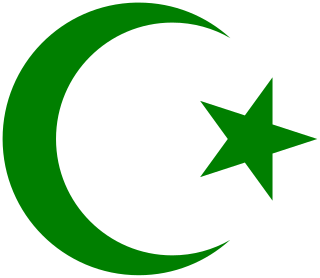
Islamism is a concept whose meaning has been debated in both public and academic contexts. The term can refer to diverse forms of social and political activism advocating that public and political life should be guided by Islamic principles or more specifically to movements which call for full implementation of sharia. It is commonly used interchangeably with the terms political Islam or Islamic fundamentalism. In academic usage, the term Islamism does not specify what vision of "Islamic order" or sharia are being advocated, or how their advocates intend to bring them about. In Western mass media it tends to refer to groups whose aim is to establish a sharia-based Islamic state, often with implication of violent tactics and human rights violations, and has acquired connotations of political extremism. In the Muslim world, the term has positive connotations among its proponents.

The Society of the Muslim Brothers, better known as the Muslim Brotherhood, is a transnational Sunni Islamist organization founded in Egypt by Islamic scholar and schoolteacher Hassan al-Banna in 1928. Al-Banna's teachings spread far beyond Egypt, influencing today various Islamist movements from charitable organizations to political parties—not all using the same name.
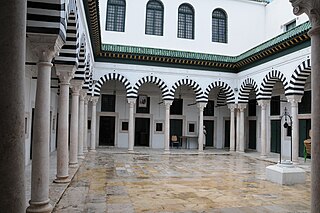
Ez-Zitouna University is in Montfleury, Tunis. It was first established in 737 and subsequently modernised in 1956. It consists of the Higher Institute of Theology and the Higher Institute of Islamic Civilisation in Tunis and a research institution, the Center of Islamic Studies, in Kairouan.
The Centre for the Advanced Study of the Arab World(CASAW) is a government funded, research based initiative which claims to be at the forefront of UK expertise in the Arab World.
Dr. Mamoun Fandy is an Egyptian-born American scholar. He is president of the think tank London Global Strategy Institute, a former senior fellow at the Baker Institute, the United States Institute of Peace, and at the International Institute for Strategic Studies in London. Before that Fandy was a research professor of politics at the Center for Contemporary Arab Studies at the School of Foreign Service of Georgetown University, as well as of Arab politics at the National Defense University. He is frequently seen on American television, and is a columnist for Al-Ahram and the Asharq Al-Awsat.

A presidential election was held in Egypt in two rounds, the first on 23 and 24 May 2012 and the second on 16 and 17 June. The Muslim Brotherhood declared early 18 June 2012, that its candidate, Mohamed Morsi, won Egypt's presidential election, which would be the first victory of an Islamist as head of state in the Arab world. It was the second presidential election in Egypt's history with more than one candidate, following the 2005 election, and the first presidential election after the 2011 Egyptian revolution which ousted president Hosni Mubarak, during the Arab Spring. However, Morsi's presidency was brief and short-lived, and he later faced massive protests for and against his rule, only to be ousted in a military coup in July that year.
The al-Ahram Center for Political and Strategic Studies (ACPSS) is an Egyptian research institute specializing in political science created in 1968 as part of the al-Ahram Foundation.

The Ministry of Foreign Affairs of Tunisia is a cabinet-level governmental agency in Tunisia in charge of conducting and designing the foreign policy of the country.
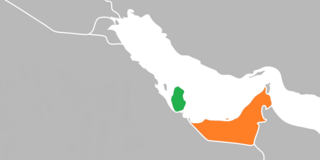
Qatar–United Arab Emirates relations are the relations between Qatar and the United Arab Emirates (UAE). The relationship between the two countries has been severed following the Qatar diplomatic crisis.
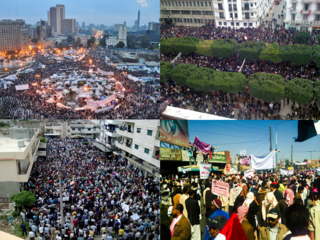
The Arab Spring was a series of anti-government protests, uprisings, and armed rebellions that spread across much of the Arab world in the early 2010s. It began in response to oppressive regimes and a low standard of living, starting with protests in Tunisia. From Tunisia, the protests then spread to five other countries: Libya, Egypt, Yemen, Syria and Bahrain, where either the ruler was deposed or major uprisings and social violence occurred, including riots, civil wars or insurgencies. Sustained street demonstrations took place in Morocco, Iraq, Algeria, Iranian Khuzestan, Lebanon, Jordan, Kuwait, Oman and Sudan. Minor protests occurred in Djibouti, Mauritania, Palestine, Saudi Arabia, and the Moroccan-occupied Western Sahara. A major slogan of the demonstrators in the Arab world is ash-shaʻb yurīd isqāṭ an-niẓām.

The Ennahda Movement, also known as Renaissance Party or simply Ennahda, is a self-defined "Muslim democratic" political party in Tunisia. Founded as "The Movement of Islamic Tendency" in 1981, Ennahda was inspired by the Abul A'la Maududi, and Egyptian Muslim Brotherhood, it has also been called by Robert F. Worth "the mildest and most democratic Islamist party in history". Rached Ghannouchi is the movement's founder and has remained its president for 38 years without interruption.

Rafik Ben Abdessalem Bouchlaka is a Tunisian politician. He served as the minister of foreign affairs under Prime Minister Hamadi Jebali.
Al Islah was an Islamist group based in the United Arab Emirates that was highly affiliated and considered part of the Muslim Brotherhood. The political group was banned and was designated as a terrorist group after attempting to form a military wing for a coup d'état against the government.

The National Rally for Reform and Development, often known by its shortened Arabic name Tewassoul, is an Islamist political party in Mauritania. The party put forward their leader, Mohamed Jemil Ould Mansour, as their candidate for the 2009 Mauritanian presidential election.

Middle East Eye (MEE) is a London-based online news outlet covering events in the Middle East. MEE describes itself as an "independently funded online news organization that was founded in April 2014". It seeks to be the primary portal of Middle East news, and describes its target audience as "all those communities of readers living in and around the region that care deeply for its fate".
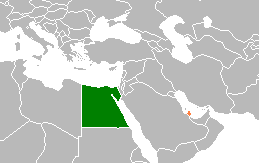
Egypt–Qatar relations were the bilateral relations between the State of Qatar and the Arab Republic of Egypt. They first began in 1972 and ceased in 2017 due to the Qatar diplomatic crisis.
Badr Hassan Shafi’i is an author, political scientist focusing on African affairs, and a regular contributor to multiple media organizations.

The Qatar–Saudi Arabia diplomatic conflict, sometimes referred to as the Second Arab Cold War, is the ongoing struggle for regional influence between the Gulf Cooperation Council (GCC) monarchies of Qatar and the Kingdom of Saudi Arabia (KSA). Qatar–Saudi Arabia relations have been especially strained since the beginning of the Arab Spring, that left a power vacuum both states sought to fill, with Qatar being supportive of the revolutionary wave and Saudi Arabia opposing it. Both states are allies of the United States, and have avoided direct conflict with one another.

Lidia Anna Milka-Wieczorkiewicz is a Polish historian and diplomat, ambassador to Algeria (2006–2011) and Tunisia.
Mohammad Doroudian is an Iranian writer, historian, researcher and theorist. He was born on 1959 in Tehran. He is active in writing the history of the Iran-Iraq War. He holds a BA in History from Shahid Beheshti University. More than seventeen books have been published by Mohammad Doroudian so far. He is one of the elect of the 31st Iran's Book of the Year Awards and the winner of the 8th Holy Defense Year Book Award.













